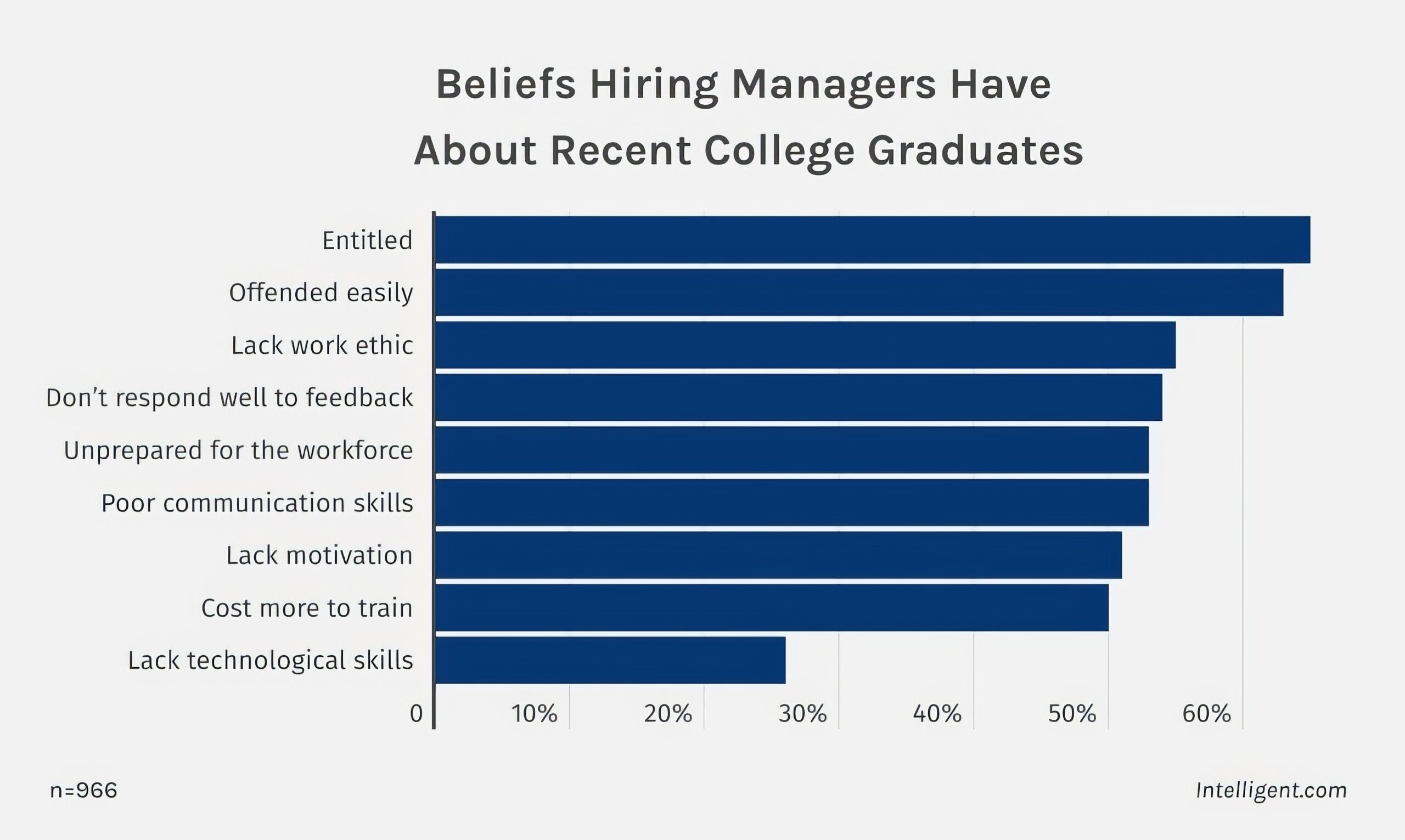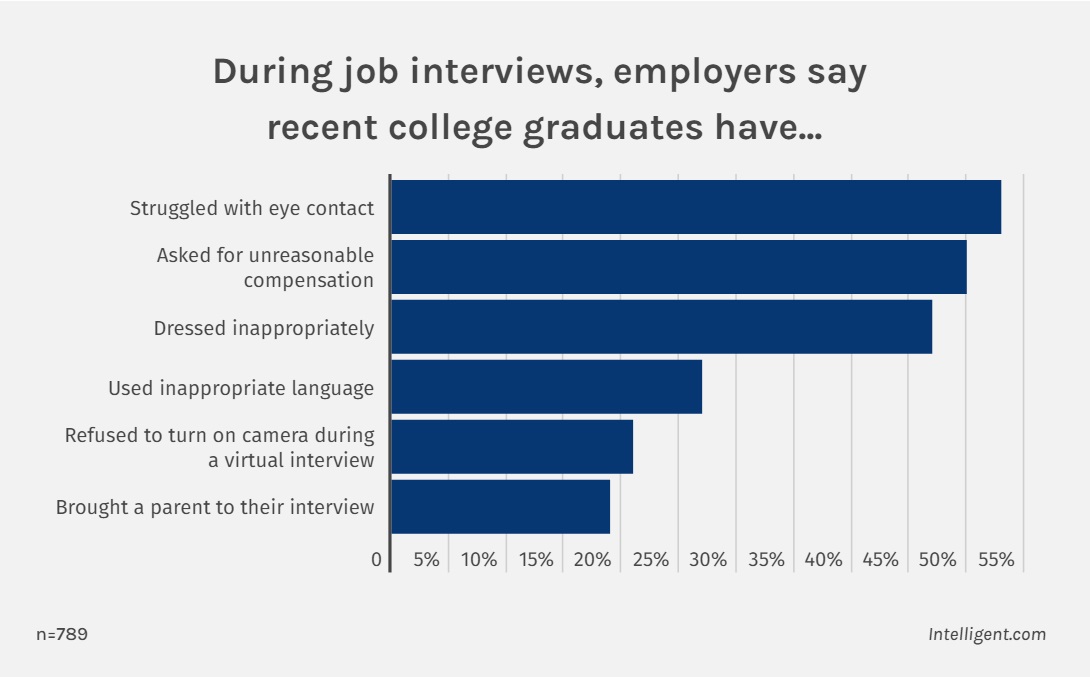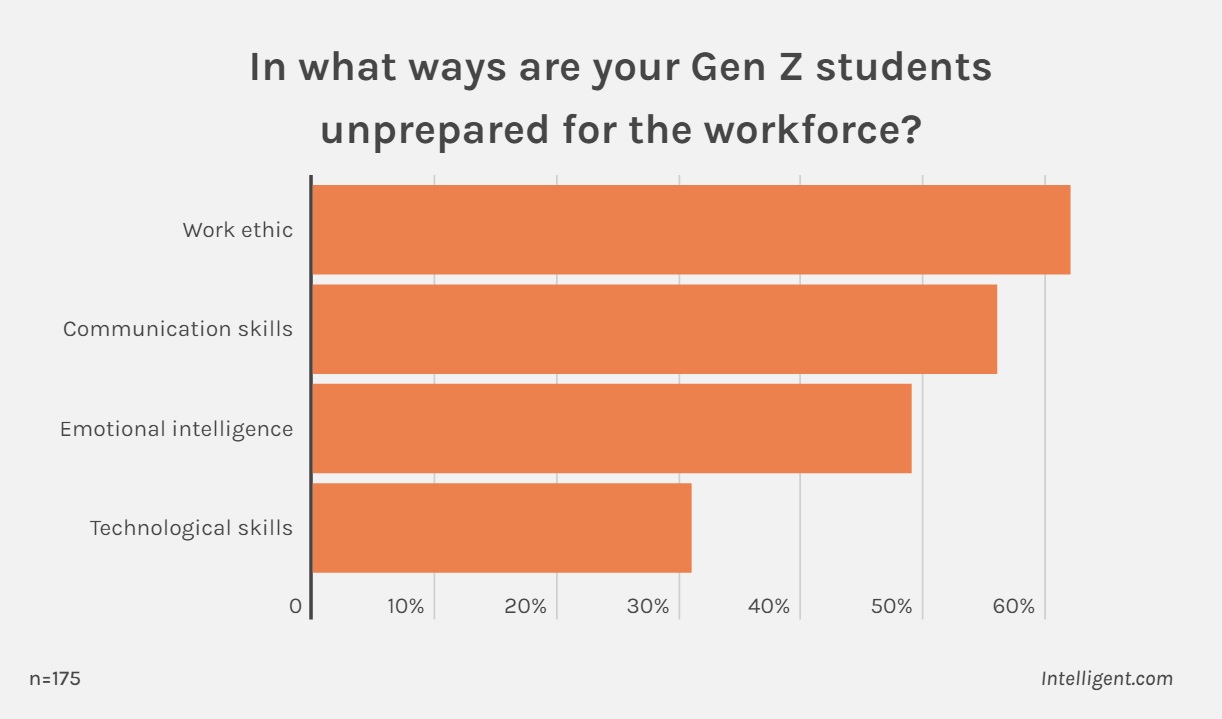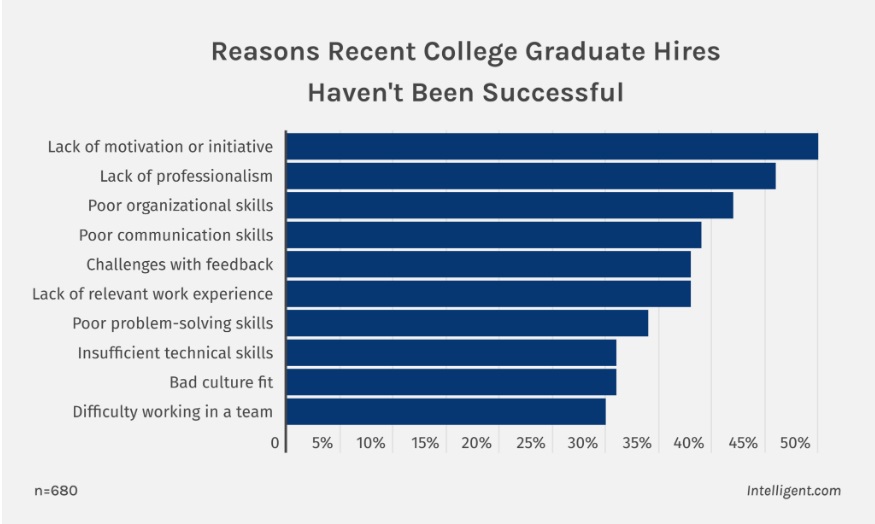If you’re an employer you hardly need me to tell you that recent college grads are, by and large, a significant disappointment, and a source of major challenges. Recent studies have found that Gen Z (individuals born between the mid-1990s and early 2010s) and who are graduating from colleges now, are posing a significant problem for employers these days.
Four studies by Intelligence were conducted in Dec and Sept 2023 and Aug and Oct 2024. They focused on the new trend of employers avoiding hiring recent college grads, claims that recent grads lack workplace etiquette (amongst other skills), assertions that Gen Z is more difficult to work with than previous generations, and their entitlement, thin skins, and poor communication skills.
Our clients are also complaining about the same things that these studies have highlighted. It seems to be a nearly universal occurrence across North America. The findings are concerning, widespread, and difficult to resolve. None of this bodes well for employers or for young people entering the workforce.
The Bad News
The problems that Gen Z is bringing to the workplace are numerous and serious.
- 81% of business leaders say recent college graduates need workplace etiquette training,
- 75% of companies report that some or all of the recent college graduates they hired were unsatisfactory,
- 63% of employers agree that recent college grads are entitled,
- 58% of those surveyed say that recent college graduates are unprepared for the workforce,
- 57% say Gen Z lacks professionalism,
- 55% report that Gen Z does not respond well to feedback,
- 54% of responders think that Gen Z has a poor work ethic,
- 52% state that Gen Z has poor communication skills,
- 46% of respondents would rather hire an older employee who is overqualified in order to avoid working with someone younger,
- 38% of employers actually are avoiding hiring recent college graduates in favor of older employees,
- 6 in 10 companies fired a recent college graduate that they hired this year,
- 2 out of 3 employers say that recent college grads can’t manage their workload,
- Over 20% of recent grads refused to turn on cameras during a virtual interview,
- 1 in 5 employers have had a recent college graduate bring a parent to a job interview,
- 1 in 3 educators say their Gen Z students are unprepared for the workforce; work ethic tops the reasons for why,
Those surveyed also say that Gen Z lacks the ability to take constructive criticism, demonstrate proper cell phone use, and have poor conflict resolution skills.




Meanwhile there are others who claim that having Gen Z in the workplace is a good thing. They are blessed with unparalleled technological prowess, entrepreneurial spirit, and a commitment to social causes. Gen Z is highly adept at multitasking and navigating digital nuances, so say others. They are also the most diverse and best educated generation ever, apparently. A multi-year study by Roberta R. Katz found that Gen Z don’t necessarily see elders as experts, and consider honesty and openness as important. Other research finds that Gen Z prefers to communicate through digital channels, such as instant messaging apps, social media platforms, and video calls. Concordia University reports that Gen Z want to be coached and are the “most accepting generation yet.” Yet at the same time respondents to other surveys state that they’re “worried about being called out by Gen Z for saying the wrong thing.”
Some of what’s above is obviously contradictory. How can the ‘most accepting generation’ also be lousy at taking feedback or resolving conflicts? If they’re so good at multitasking, then why do two thirds of employers complain that they can’t handle their workloads? If nearly 60% of employers and a third of teachers don’t consider Gen Z ready for the workforce then why are those like Concordia and Rasmussen University, the Stanford Report, and Glassdoor extolling their virtues so loudly?
Make it make sense!
Thankfully, that’s not my job. More knowledgeable people than I may have answers to those questions, but I do not. What’s unarguable, however, is that Gen Z will overtake Boomers in the full-time workforce and so, employers (and the rest of us) will have to deal with them one way or another.
The Good News
Regardless of the positives or negatives that Gen Z may or may not bring with them, they will inevitably become a sizable part of the workforce soon. If they’re unprepared for work because of educational failings, their style of upbringing, the society they were born into, or due to other factors, the fact remains that someone will have to hire them, and they will have to integrate into a multi-generational workforce. None of this may be their fault per se, but regardless of the reasons, these deficits remain and will need to be addressed.
If applicants arrive eager and full of promise but lack critical skill sets, then fair or not, it’s going to fall upon employers to provide them, and to coach and train this generation to bring them up to speed. Yes, they may think differently, use technology differently, have a different communication style, dislike hierarchy, and require a different approach. None of that, however, changes the fact that work ethic, time management, organizational skills, communication skills, basic garden-variety common courtesies (like eye contact), and workplace etiquette, are qualities required for success – regardless of which generation you’re a member of.
The reality is that although employers can screen for a vast array of desirable aptitudes and attitudes, that won’t help them if the applicant pool is largely devoid of these attributes. What do you do then? You can’t just pause all hiring for another 15 years and hope for a better-skilled generation to be produced. That’s not practical, so, you have to work with what you’ve got.
Although it may sound obvious, the first thing to be done is to identify which deficits in behaviour, attitude, or skill exist. After that, it’s easier to apply solutions. Some deficiencies may be readily apparent – to you – but may be less obvious to those who have them.
Surprise! There’s a test for that!
Using an appropriate assessment (either pre- or post-hire) will go a long way towards identifying and quantifying the existence and severity of the gaps that exist.
If team working skills are lacking, figure out if the individual is even team oriented. Tools like the Team vs Individual Orientation Test will help identify them, and the Team Role Profiler helps determine a person’s aptitude for teamwork, and identifies the type of role(s) they’re best suited for. If you don’t want to be seen as singling out an individual you can assess the entire team and give every member some useful feedback and identify growth opportunities with tools like the TEAM 360 and others.
For individuals struggling with eye contact and poor communication then tools like the Communication Skills Assessment, Interpersonal Skills Test, Communication Effectiveness Profile, Business Communication or the INSIGHT Inventory will help people gain in-depth insights into themselves, better understand others, and identify how to flex (adapt) their style to communicate better.
For some organizations it may be necessary and effective to address the culture of the entire company. Tools like the Organizational Effectiveness Inventory or Organizational Climate Workbook, or even the Diversity and Cultural Awareness Profile can offer relief, focus, and direction.
Those who struggle with their workload may also struggle with managing their time effectively. There are also tools to help address that, like the Project Time Management, Time Management Evaluation, Time Management test, Time Management Inventory and this Time Management test as well.
Some applicants may lack common sense and struggle to know when privacy and confidentiality rules apply. Assessments like the Employee Attitude & Personality Test include measures of street smarts, integrity, and calculated risk taking. The Watson-Glaser Critical Thinking Appraisal and General Reasoning Aptitude Test will help those who struggle to make appropriate decisions and foresee logical consequences. A range of tools target ethics and ethical behaviour competencies like the Ethical Type Indicator, Business Ethics Awareness, the Workplace Essentials Profile, and the Soft Skills Inventory.
Applicants who have low emotional intelligence can be shown where they need to develop their skills, and coached to do so using tools like the Multidimensional Emotional Intelligence Assessment, Emotional Intelligence Skills Assessment, Multidimensional Emotional Intelligence Quotient, and Occupational Personality Questionnaire.
Poor cultural fit can also derail an otherwise well skilled new hire. There are ways to screen for that too. Assessments like the Work Style Lens and the Workplace Personality Inventory offer deep insights into what a person’s go-to work-styles are, and they are deadly accurate at predicting how an individual will actually behave on the job. The Work Personality Index takes this further by offering reports for selection purposes, leadership and leadership potential, personal development, and career transition. It can also be customized to generate an ’ideal candidate profile’ or wish list if you will, that matches the applicant’s responses against the desired traits matrix and indicates how close a fit for the job the candidate is.
What employers and HR professionals need to keep in mind is that solutions already exist to help resolve many of the problems outlined in this article. Although there are no silver bullets or quick fixes, the fact remains that usually, there’s a test for that. No matter what challenges a new employee brings to the organization, and no matter what generation they’re from, there are ways to help employers screen for what they want and need, and to help them provide remedial intervention and developmental assistance to those who fail to meet expectations.
Remember, few of us hit the ground running when first starting out. None of us got to where we are today without added instruction, learning, growth, failures, criticism, and setbacks. Gen Z may be a unique pain in the butt in some new and not-so-wonderful ways, but so what else is new under the sun?
There are lots of ways to help them become the kinds of employees that you want them to be, because as always, there’s a test for that so, use them and the experts who provide them to your best advantage, and don’t lose hope.
References:
https://www.intelligent.com/1-in-6-companies-are-hesitant-to-hire-recent-college-graduates/
__________________________________________________________
David Towler is President of Creative Organizational Design, a firm offering nearly 50 years of expertise specializing in employee assessments and has over 5000 different tests available. Creative Organizational Design has assessments designed to help employers screen out other people’s rejects, assess skills, aptitudes, attitudes, and ‘fit’ within an organization. For more information about the many options available and to obtain expert help in selecting the best tools for your needs please contact us because no matter what personnel challenges you’re facing – there’s a test for that! Please send comments about this article to dtowler@creativeorgdesign.com.
